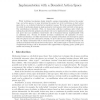228 search results - page 29 / 46 » Expected Reachability-Time Games |
ATAL
2010
Springer
13 years 9 months ago
2010
Springer
Multi-agent learning is a crucial method to control or find solutions for systems, in which more than one entity needs to be adaptive. In today's interconnected world, such s...
ATAL
2010
Springer
13 years 9 months ago
2010
Springer
Recent studies have investigated how a team of mobile sensors can cope with real world constraints, such as uncertainty in the reward functions, dynamically appearing and disappea...
ATAL
2008
Springer
13 years 10 months ago
2008
Springer
Mechanism design (MD) has recently become a very popular approach in the design of distributed systems of autonomous agents. A key assumption required for the application of MD is...
SAGT
2009
Springer
14 years 3 months ago
2009
Springer
We consider the loss in social welfare caused by individual rationality in matching scenarios. We give both theoretical and experimental results comparing stable matchings with soc...
SIGECOM
2006
ACM
14 years 2 months ago
2006
ACM
While traditional mechanism design typically assumes isomorphism between the agents’ type- and action spaces, in many situations the agents face strict restrictions on their act...

